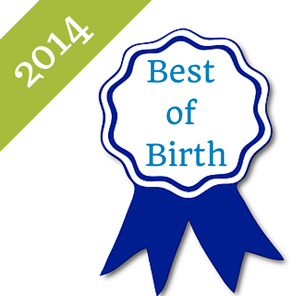December 29, 2014
Best in Birth for 2014
By: Sharon Muza, BS, LCCE, FACCE, CD/BDT(DONA), CLE | 0 Comments
By Cara Terreri, LCCE
 As the year winds down this week, many will take stock of the best and worst of happenings throughout the year. In the world of maternity care, there are several notable and promising advances, discoveries, and recommendations in care practices. ICYMI (in case you missed it), we'd like to share the best in birth for 2014.
As the year winds down this week, many will take stock of the best and worst of happenings throughout the year. In the world of maternity care, there are several notable and promising advances, discoveries, and recommendations in care practices. ICYMI (in case you missed it), we'd like to share the best in birth for 2014.
The Journal of Midwifery and Women's Health released important new U.S. research on the outcomes of home birth entitled 'Outcomes of Care for 16,924 Planned Home Births in the United States: The Midwives Alliance of North America Statistics Project, 2004 to 2009.' This was the first study on outcomes of home births since 2005. For a in-depth review of the study, check out this and this.
In February, the American College of Obstetricians and Gynecologists and the Society for Maternal-Fetal Medicine issued a joint Obstetric Care Consensus Statement: Safe Prevention of the Primary Cesarean Delivery. The statement aims to change the way practitioners manage labor in an effort to reduce the cesarean rate, and was considered by many a major game changer in how women are cared for in labor. The ACOG press release is here, which provides more detail of the study. Science & Sensibility covered it here.
Evidence Based Birth a well-respected resource site for birth practices, published the article, 'Evidence for the Vitamin K Shot in Newborns,' which examines Vitamin K deficiency bleeding (VKDB), a rare but serious consequence of insufficient Vitamin K in a newborn or infant that can be prevented by administering an injection of Vitamin K at birth. The article helps to clear up many misconceptions and questions surrounding the Vitamin K shot. Sharon Muza interviews Rebecca on this topic here.
Lamaze International launched a series of online parent classes that cover a variety of topics on pregnancy, birth, and breastfeeding. The online classes are presented in an interactive, engaging format with unlimited access so you can complete the class at your own pace. They provide vital information, and are recommended to be followed up with a traditional, in-depth childbirth class. Topics covered include, VBAC, Six Healthy Birth Practices, and Breastfeeding Basics. A Pain Management and Coping Skills class will be released shortly in the new year.
The journal Birth published a study that compared the difference between nonpharmacologic (aka: non-drug) pain management during labor with more typical pain relief techniques. Results showed that nonpharmacologic pain relief techniques can reduce the need for medical interventions. Read an in-depth review here.
The 'family-centered cesarean' birth continued to emerge as an option for more families as new providers and hospitals adopted practices to facilitate the approach. For more information, check out the Family Centered Cesarean Project and this article.
Out-of-hospital (OOH) births rates continued to increase, according to a report from the National Center for Health Statistics released this year. The report also showed that OOH births generally had lower risk than hospital births, with lower percentages of preterm birth and low birth weight.
Work continued on human microbiome (aka: healthy gut bacteria) research, and further investigation is underway on the impact of cesarean birth and infant gut bacteria colonization, and the potential benefits of artificially transferring mother's bacteria to baby.
What other groundbreaking maternal infant topics do you feel made a big leap in 2014? Share the topic and any relevant links in our comments section.
About Cara Terreri

Cara began working with Lamaze two years before she became a mother. Somewhere in the process of poring over marketing copy in a Lamaze brochure and birthing her first child, she became an advocate for childbirth education. Three kids later (and a whole lot more work for Lamaze), Cara is the Site Administrator for Giving Birth with Confidence, the Lamaze blog for and by women and expectant families. Cara continues to have a strong passion for the awesome power and beauty in pregnancy and birth, and for helping women to discover their own power and ability through birth. It is her hope that through the GBWC site, women will have a place to find and offer positive support to other women who are going through the amazing journey to motherhood.
Tags
Childbirth education Cara Terreri Professional Resources Best Of 2014